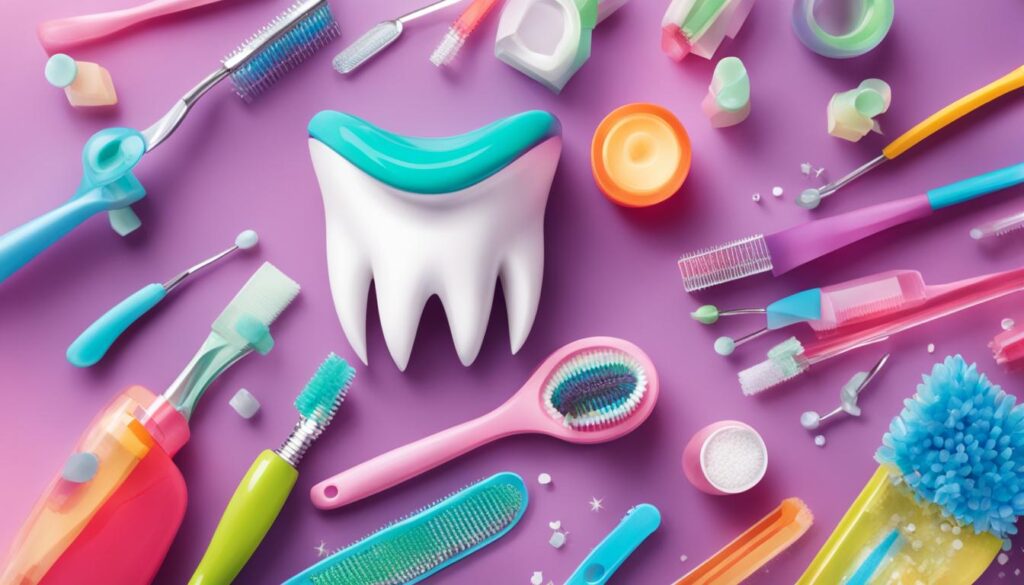We may earn money or products from the companies mentioned in this post.
Dental hygiene is a crucial aspect of oral health, and pursuing a career in this field can be highly rewarding. Whether you are just starting or looking to advance your career, a comprehensive dental hygiene education is essential. In this section, we will provide you with a guide to dental hygiene education content that covers everything from dental hygiene programs to online courses and certification requirements.
If you are passionate about promoting oral health and want to learn more about dental hygiene education, read on.
Key Takeaways
- Dental hygiene education is a crucial aspect of oral health
- Comprehensive education includes dental hygiene programs, online courses, and certification requirements
- Career advancement in dental hygiene requires ongoing continuing education
- Various resources and study materials are available to support dental hygiene education and practice
- A fulfilling career in dental hygiene starts with a comprehensive education
Understanding Dental Hygiene Education Requirements
Embarking on a career in dental hygiene requires meeting certain educational requirements. Before seeking admission to dental hygiene programs or online dental hygiene courses, it’s essential to understand the prerequisites. Here’s what you need to know about dental hygiene education requirements:
Prerequisites for Dental Hygiene Programs
To become a dental hygienist, you must complete a dental hygiene program accredited by the Commission on Dental Accreditation (CODA). The prerequisites may vary slightly depending on the program, but the general requirements include:
| Requirement | Description |
|---|---|
| High School Diploma or GED | A basic educational qualification that demonstrates the ability to study at the college level. |
| College-Level Courses | Pre-requisite courses in biology, chemistry, and anatomy are usually required before admission into a dental hygiene program. |
| Entrance Exam | Many dental hygiene programs require an entrance exam, such as the Test of Essential Academic Skills (TEAS). |
Meeting these prerequisites and gaining admission to a CODA-accredited program is the first step to becoming a dental hygienist.
Licensing and Certification
After completing a dental hygiene program, you must obtain a state license to practice as a dental hygienist. In most states, the requirements for licensure include:
- Graduation from a CODA-accredited dental hygiene program
- Passing the National Board Dental Hygiene Examination
- Passing a clinical examination
Obtaining certification from the American Dental Association’s Commission on Dental Competency Assessments (CDCA) further demonstrates your competence in the field. Certification requires passing multiple exams that evaluate your knowledge and practical skills.
Meeting these requirements is crucial to becoming a licensed and certified dental hygienist, which is necessary to practice in most states.
Exploring Dental Hygiene Curriculum
The dental hygiene curriculum encompasses both theoretical and practical aspects. It provides students with the necessary knowledge and skills to carry out tasks such as teeth cleaning and oral examination, aiding in the prevention and treatment of oral diseases. A typical dental hygiene curriculum comprises various core subjects and hands-on training.
The core subjects usually include anatomy and physiology, nutrition, microbiology, and pharmacology. These subjects provide students with a strong foundation in human biology and pathology. Additionally, dental hygiene students take courses in dental hygiene theory, dental radiography, and dental materials to acquire the requisite professional knowledge.
Practical experiences and training form an integral part of a dental hygiene education. Typically, dental hygiene students must complete clinical rotations to gain practical experience in various dental procedures. During these rotations, students work alongside experienced dental hygienists and dentists to provide dental services to patients. They learn how to perform teeth cleaning, take X-rays, and educate patients about oral health.
Dental Hygiene Curriculum Overview
| Core Subjects | Practical Training |
|---|---|
| Anatomy and Physiology | Clinical Rotations |
| Nutrition | Oral Examination |
| Microbiology | Teeth Cleaning |
| Pharmacology | Dental Radiography |
| Dental Hygiene Theory | Dental Materials |
The dental hygiene curriculum aims to equip students with a wide range of skills, including critical thinking, communication, and problem-solving. Students learn how to communicate effectively with patients and provide preventive dental care, including oral health education and nutritional counseling.
Overall, the dental hygiene curriculum provides students with a comprehensive understanding of oral health and the skills necessary to perform dental hygiene procedures effectively. This education is vital for aspiring dental hygienists as it prepares them to become competent professionals in the field of oral health care.
Online Dental Hygiene Courses: Convenience and Flexibility
Online learning has revolutionized education, making it more accessible and convenient for students all around the world. Dental hygiene education is no exception. Pursuing online dental hygiene courses provides a flexible and convenient way to complete the program.
While traditional brick-and-mortar schools have their own advantages, online courses offer unique benefits that cater to different learners’ needs. In online dental hygiene courses, you can:
- Complete the coursework on your schedule, without disrupting your work or personal life.
- Access the courses and materials from anywhere, as long as you have an internet connection.
- Learn at your own pace and focus on specific topics that interest you the most.
Moreover, online dental hygiene programs often cost less than their on-campus counterparts, saving you money on tuition and other expenses.
Quality of Online Dental Hygiene Courses
Online dental hygiene courses are not inferior to traditional programs in terms of quality and rigor. Accredited online dental hygiene programs must meet the same standards as their on-campus counterparts. Additionally, online programs often feature experienced faculty who design the courses specifically for online learning. Therefore, you can be assured that you will receive an education that meets, or even exceeds, your expectations.
That being said, online learning requires self-discipline and motivation. You need to be proactive in your learning and communicate with your professors and classmates regularly. The key to success is treating online dental hygiene courses with the same level of dedication and commitment as you would in a traditional program.
Dental Hygiene Certification: A Step Towards Professionalism
Obtaining dental hygiene certification is an essential step in establishing yourself as a professional in the field. Certification provides credibility and recognition of your skills and knowledge as a dental hygienist, making you more marketable to potential employers.
The first step towards certification is graduating from an accredited dental hygiene program. Once you have completed your education, you will need to pass the National Board Dental Hygiene Examination (NBDHE) and a clinical board exam. These exams test your knowledge, clinical skills and judgment, and ensure that you meet the standards required to practice as a dental hygienist.
The NBDHE consists of 350 multiple-choice questions covering various aspects of dental hygiene practice, including patient assessment, oral health education, and community health. The clinical board exam involves demonstrating your ability to perform dental hygiene procedures, such as scaling and root planing, on a live patient.
Once you have passed both exams, you can apply for state licensure. Licensing requirements vary by state, so it’s important to research the specific requirements of the state in which you plan to practice.
Maintaining your certification requires completing continuing education courses. The specific number of hours required varies by state and is typically due every 2-3 years. Continuing education ensures that dental hygienists stay current with the latest advancements in the field, providing the best possible care to their patients.
Overall, pursuing dental hygiene certification is an investment in your career. It demonstrates your commitment to professionalism and provides invaluable opportunities for growth and development.
Dental Hygiene Continuing Education: Staying Ahead in the Field
As a dental hygienist, it is essential to stay updated with the latest advancements in the field, and continuing education can help you achieve this goal. Dental hygiene continuing education programs can help you expand your knowledge, refine your skills, and stay ahead of the competition.
Several dental hygiene associations offer continuing education courses and programs. These courses cover various topics, including new treatment methods, emerging technologies, and patient management. Attending these courses provides you with an opportunity to network with other dental professionals and learn from their experiences.
Many online platforms offer dental hygiene continuing education courses, providing you with flexibility and convenience. You can take these courses at your own pace and schedule, making it easier to balance your professional and personal life.
Benefits of Dental Hygiene Continuing Education
The benefits of dental hygiene continuing education are numerous. Here are a few:
- Stay up-to-date with the latest advancements in dental hygiene practice.
- Enhance your knowledge and skills in the field.
- Stay competitive in the job market.
- Improve patient care and outcomes.
- Meet licensing and certification requirements.
Types of Dental Hygiene Continuing Education
Dental hygiene continuing education courses come in various formats, including:
- Online courses
- In-person courses and conferences
- Webinars and online seminars
- Self-study programs, including textbooks and journals
Choosing the Right Dental Hygiene Continuing Education Program
It is essential to choose a dental hygiene continuing education program that aligns with your career goals and interests. Consider the following factors when choosing a program:
- Accreditation and certification
- Course content and relevance to your professional goals
- Costs and fees
- Delivery format and scheduling flexibility
- Quality of instructors and course materials
By choosing the right dental hygiene continuing education program, you can gain knowledge, skills, and resources that can help you advance in your career and stay ahead of the curve in the field.
Dental Hygiene Resources and Study Materials
Aspiring dental hygienists need access to a range of resources and study materials to support their education. Here, we highlight some excellent resources to help dental hygiene students maximize their learning experience:
Dental Hygiene Textbooks
Textbooks play a crucial role in dental hygiene education. They provide in-depth coverage of core subjects, including dental anatomy, oral pathology, and radiography. Some popular dental hygiene textbooks include:
- Wilkins’ Clinical Practice of the Dental Hygienist by Linda D. Boyd
- Dental Hygiene: Theory and Practice by Michele Leonardi Darby and Margaret Walsh
- Periodontology for the Dental Hygienist by Dorothy A. Perry and Phyllis L. Beemsterboer
Online Dental Hygiene Resources
There are several online resources available to support dental hygiene education. The following resources provide comprehensive information, exam preparation, and career development opportunities for dental hygiene students:
- American Dental Hygienists’ Association (ADHA): The ADHA offers an array of professional development opportunities, including online courses and webinars.
- National Board Dental Hygiene Examination (NBDHE): The NBDHE is a comprehensive exam that evaluates the knowledge and skills of dental hygiene students. The official exam website includes valuable resources and exam preparation materials.
- Dentalcare.com: Powered by Crest and Oral-B, Dentalcare.com offers interactive courses, webinars, and other educational resources for dental hygiene students.
Clinical Practice Materials
Hands-on experience is essential for dental hygiene students. Clinical practice materials, such as models and simulators, provide an opportunity to practice scaling and other clinical procedures. Some resources for clinical practice materials include:
- Kavo Kerr Group: Kavo Kerr Group offers a range of dental products, including dental simulators for scaling and other clinical practice.
- 3M Oral Care: 3M Oral Care provides a variety of dental products, including models and simulators for clinical practice.
By utilizing these resources and study materials, dental hygiene students can enhance their learning experience and prepare themselves for a fulfilling career in dental hygiene.
Conclusion
Comprehensive dental hygiene education content is essential for building a successful career in this field. By understanding the education requirements, exploring the curriculum, and leveraging online courses, certification, and continuing education opportunities, you can establish yourself as a dental hygiene professional.
Access a Wealth of Resources
There are many resources available to support your dental hygiene education journey. Online platforms, textbooks, and study materials can enhance your learning experience and ensure you stay up-to-date with the latest advancements in dental hygiene practice.
By accessing these resources and leveraging your education opportunities, you can gain valuable insights into the world of dental hygiene and continue to grow and develop in your career.
Embark on a Fulfilling Career
Comprehensive dental hygiene education content plays a vital role in shaping successful dental hygienists. By combining your education with practical experience and ongoing professional development, you can embark on a fulfilling career in dental hygiene.
Take advantage of the many opportunities available to you and become a trusted and respected member of the dental hygiene community.
Overall, Dental Hygiene Education Content is crucial in helping individuals pursue their passion in dental hygiene and ultimately, make a difference in people’s lives.
FAQ
What is dental hygiene education content?
Dental hygiene education content refers to the knowledge and resources provided in dental hygiene programs and courses. It includes information about oral health, dental procedures, patient care, and the skills required to become a dental hygienist.
What are dental hygiene programs?
Dental hygiene programs are educational programs designed to train individuals in the field of dental hygiene. These programs typically cover topics such as oral anatomy, dental radiography, periodontal therapy, and preventive dental care.
Can I pursue dental hygiene courses online?
Yes, there are online dental hygiene courses available that provide convenience and flexibility for individuals interested in pursuing a career in dental hygiene. These courses allow you to learn at your own pace and from the comfort of your own home.
What are the requirements for dental hygiene education?
The requirements for dental hygiene education may vary depending on the program and institution. In general, you will need to have a high school diploma or equivalent, complete prerequisite courses, and pass an entrance exam or interview to gain admission into a dental hygiene program.
What does the dental hygiene curriculum consist of?
The dental hygiene curriculum typically consists of a combination of classroom instruction and hands-on clinical practice. It covers topics such as dental anatomy, dental radiography, oral pathology, dental hygiene techniques, and patient education.
What are the benefits of online dental hygiene courses?
Online dental hygiene courses offer convenience and flexibility for individuals who may have other commitments such as work or family responsibilities. They allow you to study at your own pace and often provide interactive learning materials and support from instructors.
How do I become a certified dental hygienist?
To become a certified dental hygienist, you will need to complete an accredited dental hygiene program, pass the National Board Dental Hygiene Examination, and fulfill any additional state-specific requirements. Certification is necessary to practice as a dental hygienist in many states.
Why is continuing education important for dental hygienists?
Continuing education is important for dental hygienists to stay updated on the latest advancements in dental hygiene practice, techniques, and technology. It allows them to provide the best possible care to their patients and expand their professional knowledge and skills.
Where can I find dental hygiene resources and study materials?
There are various resources and study materials available for dental hygiene education. These include textbooks, online platforms, professional journals, and study guides specifically designed for dental hygienists. These resources can enhance your learning experience and help you succeed in your dental hygiene studies.
Affiliate Disclosure: This post may contain affiliate links. If you purchase through our link, we may receive a small commission, but at no additional cost to you. For more information, please see our Disclosure statement.



